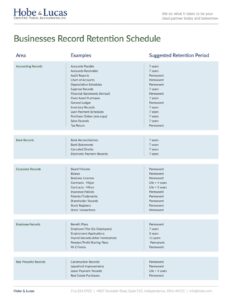
March 19, 2015
 Maintaining accurate financial records is often a daunting task, yet it is extremely important. Every business or individual should have a good records retention policy. Our clients often ask us:
Maintaining accurate financial records is often a daunting task, yet it is extremely important. Every business or individual should have a good records retention policy. Our clients often ask us:
What documents must you keep?
How long do you keep these documents?
How do the rules differ between IRS, federal and state?
What documents do you NOT need?
We’ve organized this into an easy to read PDF titled 2015 Hobe Record Retention Schedule.
To download the PDF, please enter your name and email address below:
[email-download download_id=”477″ contact_form_id=”472″]
Here are a few suggestions:
General Rules of Thumb
Businesses and individuals should retain copies of filed tax returns indefinitely. These should be kept in a safe place. If you prefer to keep your records electronically we can provide you with a secured pdf copy. However, you should be sure to backup your computer records effectively if you choose to keep only electronic records.
What about Non-Tax Related Business Records?
Certain business documentation should be kept indefinitely. This includes:
Aside from supportive tax records, other documents such as accounts payable/receivable ledgers, inventory reports, bank statements and reconciliations, invoices and expense reports should be retained for a minimum of 7 years.
What does this mean for Ohio?
Ohio’s statute of limitations is 4 years, meaning they are permitted to examine your Ohio income tax returns for one year longer than the IRS. We recommend that our Ohio business and individual clients retain all documentation for 4 years in the event of exam. Many states have statutes that differ from the IRS regulations. Be sure to check the rules in your specific state before disposing of any records.
Final Thoughts
There are no rules from the IRS when it comes to how you maintain your records, only that you be able to deliver documents promptly should they ever ask. It is extremely helpful to maintain an efficient record-keeping system, whether you prefer to keep hard copies or electronic records. Please consult your legal team or advisors for the record retention adoption policy that best suits your organization.
It is important, once you have made the decision to dispose of documentation, that you shred it thoroughly before throwing it away. These documents contain a great deal of personal information that you don’t want to fall into the wrong hands.
Should you make the decision to keep your records in an entirely electronic format, be sure an adequate and secure backup system is in place to avoid a catastrophic loss of important information should there be equipment failure.
Remember, we’re here to be your financial and tax partner all year round, not just during tax season! If you would like to discuss your individual or business situation, please give us a call at 216.524.8900.